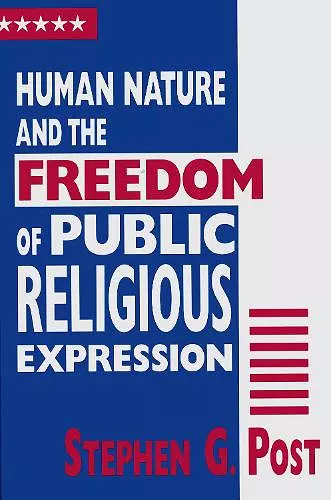Human Nature and the Freedom of Public Religious Expression
Format:Hardback
Publisher:University of Notre Dame Press
Published:6th Nov '03
Currently unavailable, and unfortunately no date known when it will be back
This hardback is available in another edition too:
- Paperback£19.99(9780268030629)

Drawing on current research in science and religion, distinguished bioethicist Stephen G. Post provocatively argues that human beings are, by nature, inclined toward a presence in the universe that is higher than their own. In consequence, the institutions of everyday life, such as schools, the workplace, and the public square, are not justified in censoring the spiritual and religious expression that freely arises from the wellspring of the human spirit.
Post believes that the privatization of religious expression, coupled with the imposition of a secular monism, is a departure from true liberal democracy in which citizens are free to assert themselves in ways that manifest their full nature. Utilizing research in the neurosciences, psychiatry, the social sciences, and evolutionary psychology, he provides scientific information supporting the idea, familiar to theories of natural law, that religious expression and freedom are essential human goods. In developing this perspective, Post also engages in a critical conversation with secular existentialism.
Human Nature and the Freedom of Public Religious Expression offers an alternative to the views of political philosophers such as Richard Rorty, and educators such as John Dewey, who fail to acknowledge the unique contribution that religious language, when thoughtfully implemented, makes to the tone and content of public debate and education. Post’s perspective privileges no particular religion, but rather asks that adherents to all faiths, including secularism, be allowed freely to express their core values in a civil, respectful, and public manner. Post calls for a recovery of the full meaning of liberal democracy in all domains of public life, so that we might again discover the value of freedom of expression.
“...a commonsense critique...” —Research News and Opportunities in Science and Theology, October 2003
“Stephen Post has done the culture a great favor. He has made religious liberty a question, not of who God is, but of who we are. And that is a question that people from many different traditions can all meaningfully engage. Agree with him or disagree with him about the finer points, you'll have to admit the debate over religion in public life will never be the same.” —Kevin J. “Seamus” Hasson, President of The Becket Fund for Religious Liberty
“This book is a valuable addition to the growing literature proposing promising alternatives to what has been called the naked public square.” —First Things
"...this work represents a valuable contribution to the discussion of religious freedom, and will be appreciated by a wide audience. Using convincing evidence from medical and neurological studies, Post has demonstrated that religious inclination lies at the heart of what it means to be human."—Perspectives on Science and Christian Faith
"... sharply reasoned and passionate.... This is a boldly creative presentation, with a useful index and rigorous contemporary sourceing, underscoring its obvious relevance to current debates about the place of religious sentiment in the public square. ...this eclectic, reflective book will prove valuable to readers and researchers in religion, psychology, political science, and the law." —Choice
“St. Augustine once wrote that our hearts will remain ‘restless till they find their rest in God.’ Stephen Post vindicates Augustine’s insight by mapping acutely our natural inclinations and intuitions of the divine. He also elaborates Augustine’s insight by arguing that our souls will become listless if they are forbidden to speak and our democracies will become feckless if they are forbidden to hear the public voices of religion. This is an elegant, erudite, and engaging meditation that brings the best of law, religion, and science into a rare and powerful combination.” —John Witte, Jr., Emory University
“Professor Post’s thought transcends sectarian boundaries by reason of his stress on the givens of human nature. His rigorous demonstration that by nature humanity should enjoy and exercise freedom of religious expression uncovers the foundations, in natural theology, for liberty — an important and urgent proposition. His book sets forth a strenuous argument on behalf of fundamental principles and demands a close reading.” —Jacob Neusner, Bard College
“… a provocative proposal … Post’s kind of public square would enable millions of Americans to speak where they have felt silenced, and to speak in their native tongue rather than an awkward second language.” —Journal of Church and State
“Although Post’s conclusion is controversial... his premise is nonetheless compelling....” —ForeWord Magazine
"...Post has itegrated diverse sources into an inclusive argument."—Journal of Religion
“It is long past time, Stephen Post persuasively argues, to stop tying ourselves into legal, philosophical, and psychological knots in trying to deny the obvious. The obvious is that people are, in maddeningly diverse ways, religious, and that the way people are is a public reality to be welcomed in order to make our common life more authentically human. This book both provokes and convinces.” —First Things
"This is a well reasoned and clearly presented thesis that merits serious consideration by thoughtful readers. Recommended for academic and public libraries.” —Library Journal
ISBN: 9780268038274
Dimensions: 216mm x 140mm x 13mm
Weight: unknown
208 pages